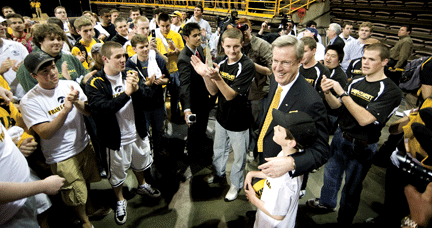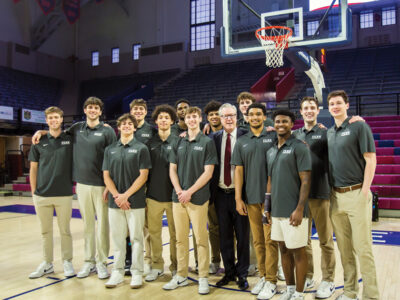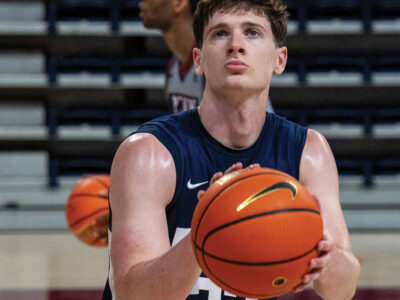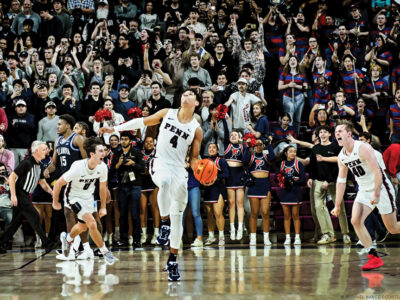
Class of ’82 | For Fran McCaffery C’82, the journey to the top of the college basketball world has been both arduous and fortuitous, filled with sleepless nights, cross-country moves, and plenty of hollering. But to understand how that journey began, it’s important to look back to the early 1980s—when, as a talented point guard for Penn, he was guided by one philosophy: expect to beat everybody.
It’s that mantra, simple though it may be, that pushed McCaffery to his first head-coaching job as a 26-year-old at Lehigh, helped him lead the University of North Carolina-Greensboro and Siena College programs to stunning turnarounds, and, most recently, allowed him to land what he calls his “dream job” as head men’s basketball coach at the University of Iowa.
“When I played at Penn, we didn’t view ourselves as anything remotely close to a mid-major,” says McCaffery, who was hired by Iowa this past March after spending the previous five seasons at Siena. “When I was there, we were a Big 5 team that expected to beat Villanova, expected to beat Temple and St. Joe’s. We expected to go on the road and beat Duke. I remember my junior year we lost in a war at Duke. Forget about moral victories. We were distraught in the locker room. We’re not supposed to lose to Duke.”
Today the idea that a team from the Ivy League is supposed to beat anyone, let alone the gold standard of all college basketball programs, is optimistic, to say the least. But it was just that kind of mentality that lured McCaffery to Penn.
Having starred for La Salle College High School and showcased his talent with an electrifying performance in the 1977 Dapper Dan Roundball Classic (essentially what the McDonald’s All-American Game is today), McCaffery first signed on to play for Wake Forest—mainly because the Ivy League still had a rule that made freshmen ineligible. But after a year at the Atlantic Coast Conference school, the kid who was nicknamed “White Magic” because of his crafty ball-handling skills decided to transfer to Penn. He got there just in time for the Quakers’ historic run to the 1979 Final Four—but, because of NCAA transfer rules, he could only practice and travel to games. Yet even though he was not an official member of the 1978-79 squad, he learned a lot from it.
“There was an incredible mental toughness about that team that I will always remember,” he says. “As a coach, you hope you get a group with that kind of confidence. These Siena teams I’ve had over the past three years have had the same mentality. They were not afraid.”
After missing most of the following season with a torn Achilles tendon, McCaffery returned to help the Quakers qualify for a berth in the 1981 NIT and then the 1982 NCAA tournament, where they lost in the first round to Chris Mullin and St. John’s.While McCaffery was best known for how well he could handle the ball for a tall guard, then-coach Bob Weinhauer also remembers him for his in-your-shorts defense.
“I can think of two or three times when the game was tied at the end and he just took the ball away from the other point guard and made the winning layup,” Weinhauer says.
And then there was his competitiveness. During a particularly nasty final Ivy weekend at Columbia and Cornell, Peter Levy W’82, Penn’s student-manager and McCaffery’s roommate, recalls McCaffery getting into a scrap with a Cornell player he believed had deliberately kicked him in his Achilles. The next night at Columbia, Levy got into a scuffle of his own when, as he recalls it, the Lions charged back out onto the court during Penn’s celebration of its league-championship-clinching win.
“When we got back to Philly that night,” Levy says, “there were boxing gloves taped to our dorm-room door.”
For McCaffery, who so embodied the Penn basketball spirit that he was named the team’s most inspirational player for the 1981-82 season, the obvious next step was coaching.
“He was always a student of the game,” Weinhauer says. “He was head and shoulders above other college kids in terms of thought process.”
McCaffery began his professional career as an assistant coach at Penn. He followed that with a stint at Lehigh, where he was soon named head coach, the youngest in the nation. From there he moved to Notre Dame, showcasing his recruiting chops as an assistant from 1988 to 1999 and vaulting to his next job, as head coach of UNC-Greensboro. In 2001, his second year, he guided UNC-Greensboro to a surprising berth in the NCAA tournament, where top-seeded Stanford awaited. Michael Brown C’83, a teammate of McCaffery’s at Penn, remembers calling his friend late one night leading up to that game.
“He was breaking down film,” Brown says. “And I said, ‘I’ll tell you what, brother. Just an hour before the game, put on Gladiator and say, ‘Let’s go get ’em!’”
In reality, McCaffery didn’t need any movies to inspire his teams; he had his own inspirational underdog story to share. And with it came a message: “We’re not going to be a team that squeezes the air out of the ball and tries to hang in there and keep the score low,” he says. “No—we’re going to come at you with an aggressive style and we’re going to score.”
His Siena teams really bought into the message, stunning Vanderbilt in the first round of the 2008 NCAA tournament and following that up with an encore performance for the ages. As the smallest school in the 2009 tournament, Siena upset the largest school, Ohio State, in double overtime—in Ohio.
“I met with his players and they told me they could see the passion in his eyes,” Levy says. “That’s what gets them up.”
After a third straight trip to the NCAAs this past March, McCaffery was one of the hottest names in the business. Seton Hall and St. John’s, two Big East schools that had fallen on hard times, courted McCaffery, but when Iowa made its offer he accepted immediately.
“Once Iowa was in play,” says his brother, Jack, a sports columnist for the Delaware County Daily Times, “there really wasn’t a close second.”
Coaching in the Big 10, one of the premier conferences in the NCAA, will certainly be a game-changer for McCaffery, who will need to scour the nation for the best high-school basketball recruits and compete against high-caliber opponents every night. But he doesn’t have to shed the underdog label just yet. Although rich in hoop history, Iowa has not been to the postseason in five years and is coming off a disastrous 10-22 season. Building the program back to prominence will be a major challenge for McCaffery, but it’s something he’s proven that he can do time and again. “When he took over UNC-Greensboro, they were down. Siena was way down and he brought them back,” Jack McCaffery says. “He will bring Iowa back to the NCAA tournament. It’s going to happen.”
—Dave Zeitlin C’03




